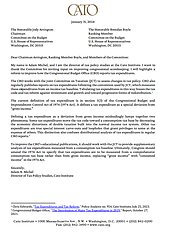Dear Chairman Arrington, Ranking Member Boyle, and Members of the Committee:
My name is Adam Michel, and I am the director of tax policy studies at the Cato Institute. I want to thank the Committee for inviting input on improving congressional scorekeeping. I will highlight a reform to improve how the Congressional Budget Office (CBO) reports tax expenditures.
The CBO works with the Joint Committee on Taxation (JCT) to assess changes in tax policy. CBO also regularly publishes reports on tax expenditures following the convention used by JCT, which measures these expenditures from an income tax baseline. Tabulating tax expenditures in this way biases the tax code and tax reform against investment and growth and toward progressive forms of redistribution.1
The current definition of tax expenditure is in section 3(3) of the Congressional Budget and Impoundment Control Act of 1974 (1974 Act). It defines a tax expenditure as a special deviation from “gross income.”
Defining a tax expenditure as a deviation from gross income misleadingly lumps together two phenomena. Some tax expenditures move the tax code toward a consumption tax base by decreasing the economic distortions of double taxation built into the normal income tax system. Other tax expenditures are true special interest carve-outs and loopholes that grant privileges to some at the expense of others. This distinction also confuses distributional analysis of tax expenditures in regular CBO reports.2
To improve the CBO’s educational publications, it should work with the JCT to provide supplementary analysis of tax expenditures measured from a consumption tax baseline. Ultimately, Congress should amend the 1974 Act to specify that tax expenditures are to be measured from a comprehensive consumption tax base rather than from gross income, replacing “gross income” with “consumed income” in the 1974 Act.

This work is licensed under a Creative Commons Attribution-NonCommercial-ShareAlike 4.0 International License.

